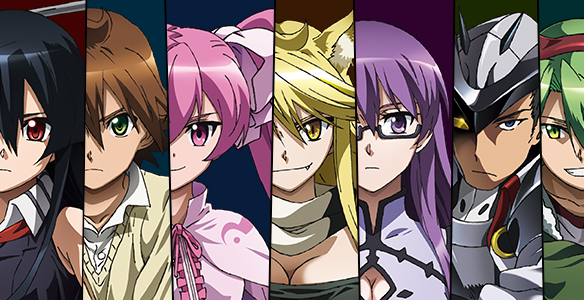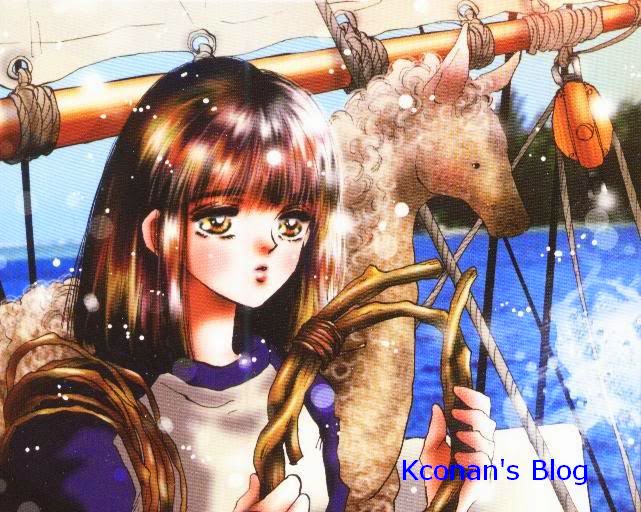Don't be put off by the art style, 7 seeds is a Josei manga with really engaging storytelling. For a quick summary, go here:
http://koalasplayground.com/2010/06/28/7-seeds/. I won't be summarising it myself, because not only is it too tedious to do so, I wouldn't be able to do justice to the story with merely a short summary.
Btw tl:dr, I did a rating on this manga (might be overated) at the bottom, share your views if you disagree? TYVM.
I might decide to do this for all my other mangas and anime as well, but I'll just do this one for now.
Many apocalyptic scenarios have been presented in works of fiction all over the world. One of the most common theme is flooding and recreating the world, destroying everything and starting anew. I really like this theme actually, perhaps because today, the world we live in is very complex, and everyone has their own petty desires that take priority over appreciating the beautiful things in life. Sometimes, I feel that what we really need is a strong enough crisis, that would band people together to fight the common cause, instead of spending time debating over healthcare budgets or how the government is managing our CPF money... When there's suddenly a crisis, all such minor issues are swept aside, and the country/world suddenly presents a united front (for the most part). But okay, enough with this, back to the story.
Imagine you were, without your knowledge, put into cyrogenic sleep. When you wake up, you find yourself in a completely new (destroyed) world, and everyone you knew was dead and gone. Would you panic, feel lost and hopeless, suicidal maybe? Initially, I felt that the author very aptly re-created the various emotions one might feel when thrown into such a scenario. I still do. But one thing I would like to question is, why were children chosen instead of adults? Particularly children who had no qualifications/records to show that they were likely to be able to survive in a harsh new world where conditions were not even certain to be suitable for living? Out of the 5 groups sent, 4 groups were chosen from civilians with no criteria other than those that were healthy, and showed some other traits such as athletic ability, or a sense for art (which would have almost no relevance to their survival).
Was it simply a love for our children, wanting them to survive, that would prompt such a decision? A number of the selected children turned out to be family members of the people who envisioned the entire project after all. This despite knowing full well that there would be high chance that these children would likely face untold dangers and go through many hardships even if they did survive. Maybe it was a decision made purely to align with the genre, manga, where the youthfulness, tenacity and drive of the young people would relate best to the target audience. I can't think of any other more compelling reason.
I mentioned that 4 out of these 5 groups were innocent children, but as for the last group, the children for that group were chosen from a group of 100 orphans, isolated from the world since birth, trained for survival. Most appalling is the means of selection, a brutal selection test that killed off the students through traps, or forcing them to kill and abandon each other for death. This as well is a common ploy, designed to instil the hardiness and desensitise the children to trauma, as well as effectively weeding out the "weak" ones.
This had the effect of creating children, who seemed way older than their age would suggest (and this is not so subtly portrayed through the larger size and more mature, often thoughtful/brooding look of these guys' design [+1: Effective use of art]). Yet while they were more than competent in surviving, their inadequacies are soon revealed, where they, in their isolated world, were not so emotionally developed - the survival test did not successfully achieve this - as compared to the children who had experienced different realities in life. Was the selection test effective? And is it right to isolate children, keep them ignorant, and kill them off when they outlive their usefulness? Most people would probably say no, I'm not so sure. They were certainly effective, their techniques and survival skills were top-notch. Within weeks of their awakening, they had set up base camp, and had a steady elevated shelter, while other groups simply struggled to secure water and food.
In comparing the two groups, it seems very much like what our education system is doing (although it certainly isn't as inhumane as what happened here). As much as the government extols the qualities and proclaims the need for a holistic education, developing emotional fortitude/social awareness/wtv, it still largely drives people to solely focus on their academic results, as that is the only marker of survival. And this results in 2 main groups of people who either become hopelessly stressed out and struggling to keep up, or become mindless work machines (I would love to say that I am neither, and perhaps the fact I am able to take time off to write this supports that claim. Unfortunately, I am not exempt from this, and even as I write this, the stress resulting from my A level examinations in 2 months is nagging at me, pressuring me to study. Still, at least I have things in life I value over studying and grades, and this is ensuring my sanity.)
As the main protagonists in 7 seeds told the "machine" kids, "Why didn't you guys ever say no? To reject the system and break free"? Unfortunately, such an action is unfathomable to us all, who are stuck within the system and cannot imagine a world without these bars. Perhaps we humans are comfortable and feel secure, when we know that something is controlling us even as we deny it. But I digress. Is the education system effective? No doubt. Is it humane? who knows. But it certainly can get better.
Okay last but not least, I really love the animal support cast in the story. Although unable to speak in human tongue, they serve as an invaluable support for the cast, especially for the lonely Aramaki, the sole survivor from the Northern group. Dogs are man's best friends, and just by being there, listening to and sharing Aramaki's pain, keeping loneliness at bay, they enabled Aramaki to survive without other humans for 18 years. And really, sometimes what we all need is just that.
Side note, I've never done this before, but let me rate the manga in a systematic manner, and also provide some supporting reasons for my rating.
Following MAL's rating system
Story: 10. No doubt about it, the
storytelling is wonderful. The
setting has much potential, and that potential is not wasted. Not just exploring a destroyed environment, but a destroyed Japan, with remnants of her past glory, and of course the 7 storage facilities.
Scientific knowledge is well-integrated, dealing with multiple issues of ecology, survival, etc. More importantly, the
sequencing of the storylines are very well integrated, supporting and adding depth to the story, instead of simplistic fillers. (parallel storylines: as the author switches between perspectives of the two groups, and backstories: very touching backstory of the "machines" children, and the Ryuugu shelter- one of the shelters attempted to house some 200 people, and the emotional recount of its demise told through one of its key member's diary). An excellent work by Tamura Yumi. I would give it 10++ if I could.
Art: 8. As I said at the start, don't let the art put you off. Common to shoujo/josei mangas, 7 seeds has that seriously annoying dish-eyes, looking overly exaggerated and fake. Apart from the eyes, the
art supports the emotional mood of the story rather well, and this can be seen from the toning of the chapters. For example, darker tones are used for "turbulent" and "chaotic" parts sparingly but effectively. Although sometimes, the "sparkly" effect is a little overdone. Nonetheless, apart from the faces [mainly the eyes], the art had
no major problems, and in fact, effectively created the mood, making the reader
feel detached at times, and
emotionally connected, or perhaps
amazed at others (the
darkness and beauty of the re-created world is very
aptly drawn out)
Characters: 8. Now here is one component that I would have
initially pegged a 5 to, but that can only be attributed to how
frustrating some of the
characters can be (particularly Natsu and Ango, main characters of Summer A and Summer B[machines kids] teams respectively). Usually, with such irritating lead characters, chances are I'd have dropped the manga by chapter 50. However, there are
many redeeming points. Many of the other
characters were really
loveable, and while reading the story, you can occasionally feel your heart pumping in nervousness and anticipation, as these characters [Hana, Aramaki, Ayu, Haru, Koruri, Arashi, Semimaru] risk themselves to explore the unknown, or sacrifice themselves[Fubuki, Mitsuru, Shigeru, Mark (the ventriloquist from the Ryuugu shelter, the last survivor who left the diary record), and the many others that died for a greater cause]. And even the most frustrating two eventually
grow to overcome their problems. Not just that, the
animal companions were really loveable too. And so, no doubt, the characters are at least deserving an 8, maybe 9.
Enjoyment: 9. Before starting on this, I was a little apprehensive, because I never liked the shoujo genre (not just for the art, but the over-emphasis on the romance). In 7 Seeds, the romance is present (OF COURSE IT HAS TO BE, romance is awesome if done in sufficient amounts), without being overwhelming, or taking over the main plot. A deeply intricate blend of scientific tidbits, historical/cultural references, action and adventurous elements, and a strong emotional driving force made 7 Seeds a joy to read, and completing the latest chapter left me starved for more. Also, the music referred to through the manga (e.g. Bridge over troubled waters) was really fitting the mood when it was used, and I tried playing the piece while reading through that chapter. If you would believe it, I got so immersed into it I actually started tearing. Overall, the excellent balance, control, and pacing of the story is more than deserving of 9.
Overall: Simply taking the average would give 8.75, but a good manga does not amount to the sum of it's parts. Each successful, thoughtfully designed element contributes to a larger whole, amplifying each other. If one part is lacking, the average would dip more as well, but together, I feel that this manga is deserving of 9.5.
And with that, a very good night to you.




































